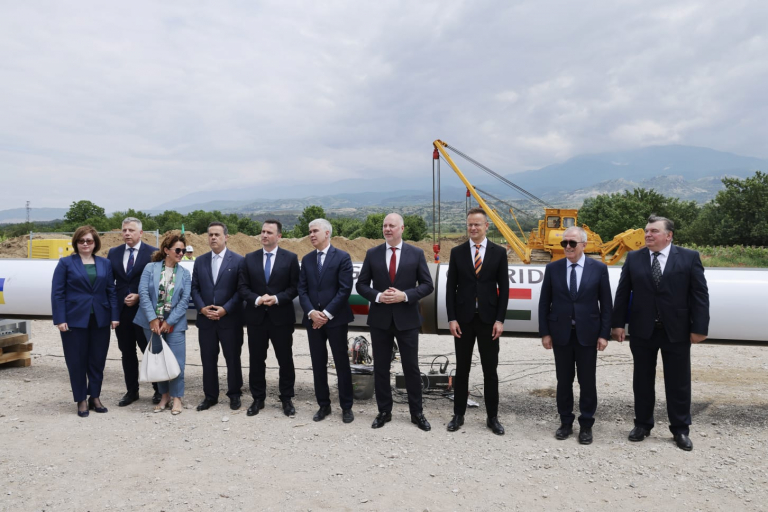
29.05.2025
The Vertical Gas Corridor is a key energy project that will ensure long-term energy security and independence both of supplies and transition for the countries of Central and Southeastern Europe. This was emphasized by Prime Minister Rossen Jeliazkov during the official inspection of the infrastructure works. The event was held in the vicinity of Mikrevo, a village in Stroumyani Municipality, in the presence of the Minister of Energy Zhecho Stankov, the Minister of Foreign Affairs and Trade of Hungary Péter Szijjártó, the Minister of Environment and Energy of Greece Stavros Papastavrou and representatives of partner countries – Romania, Slovakia, Ukraine and Moldova.
Prime Minister Rossen Jeliazkov emphasized that the project ensures, in addition to sustainable supplies and energy diversification, stability and competitiveness for decades to come.
“Countries that are partners and allies, today together we are enabling the construction of an infrastructure that will ensure energy security and independence – both in supply and transmission, Cheap and secure energy is not a matter of political debate, but of a better life for our citizens and better opportunities for the businesses,” the Prime Minister said.
Before the ceremony, Prime Minister Rossen Jeliazkov, together with the Minister of Energy Zhecho Stankov, the Minister of Foreign Affairs and Trade of Hungary Péter Szijjártó and the Minister of Environment and Energy of Greece Stavros Papastavrou assessed the progress of the project from the air.
During the inspection, basic data about the progress were presented: the corridor route is 48 kilometers, of which 37 kilometers have already been cleared; 20 kilometers of pipes have been placed, 15 kilometers have been welded and 3 kilometers have been laid and filled up.
It is expected that the project will be completed by mid-2026 and over 450 men are currently working on the site.
He project foresees to increase the transmission capacity from Greece to Bulgaria by 50% in the first stage – up to 3.6 billion cubic meters per year, and a possibility of reverse flow. The second stage is expected to double the capacity to Romania up to 10 billion cubic meters per year.
The Bulgarian segment of the corridor has three main sections: Koulata-Kresna, Piperevo-Pernik and Roupcha-Vetrino. By these, the country is taking a crucial step towards a more secure, more connected and energy-independent system.
Before the ceremony, the guests were shown a presentation by Prof. Dr. Lyudmil Vagalinski on the latest finds from the excavations in the ancient city of Heraclea Sintica, located in the vicinity.